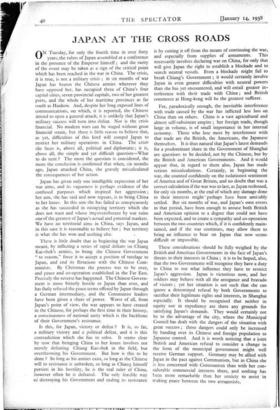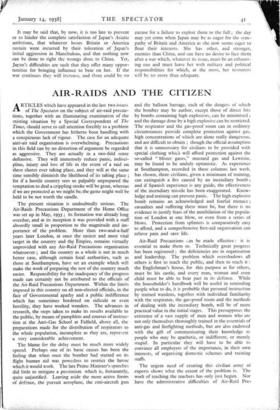JAPAN AT THE CROSS ROADS
ON Tuesday, for only the fourth time in over forty years, the rulers of Japan assembled at a conference in the presence of the Emperor himself ; and the rarity of the event may be taken as a sign of the critical point which has been reached in the war in China. The crisis, it is true, is not a military crisis ; in six months of war Japan has beaten the Chinese armies wherever they have opposed her, has occupied three of China's four capital cities, seven provincial capitals, two of her greatest ports, and the whole of her maritime provinces as far south as Hankow. And, despite her long exposed lines of communications, on which, it is reported, the Chinese intend to open a general attack, it is unlikely that Japan's military success will turn into defeat. Nor is the crisis financial. No modern wars can be waged without great financial strain, but there is little reason to believe that, as yet, difficulties of this kind will compel Japan to restrict her military operations in China. The crisis she faces is, above all, political and diplomatic ; it is, above all, the simple and yet difficult question—What to do next ? The more the question is considered, the more the conclusion is confirmed that when, six months ago, Japan attacked. China, she gravely miscalculated the consequences of her action.
Japan has given only one intelligible expression of her war aims, and its vagueness is perhaps evidence of the confused purposes which inspired her aggression ; her aim, she has said and now repeats, is to bring China to her knees. In this aim she has failed as conspicuously as she has succeeded in occupying territory which she does not want and whose impoverishment by war ruins one of the greatest of Japan's actual and potential markets. We have no territorial aims in China, says Japan, and in this case it is reasonable to believe her ; but territory is what she has won and nothing else.
There is little doubt that in beginning the war japan meant, by inflicting a series of rapid defeats on Chiang Kai-shek's armies, to bring the Chinese Government " to reason," force it to accept a position of tutelage to Japan, and end its flirtations with the Chinese Com- munists. By Christmas the process was to be over, and peace and co-operation established in the Far East. Precisely the reverse has happened. The Chinese Govern- ment is more bitterly hostile to Japan than ever, and has flatly refused the peace terms offered by Japan through a German intermediary, and the Communist leaders have been given a share of power. Worst of all, from Japan's point of view, the war appears to have created in the Chinese, for perhaps the first time in their history, a consciousness of national unity which is the backbone of their Government's resistance.
Is this, for Japan, victory or defeat ? It is, so far, a military victory and a political defeat, and it is this contradiction which she has to solve. It seems clear by now that bringing China to her knees involves not merely defeating Chiang Kai-shek in the field, but overthrowing his Government. But how is this to be done ? So long as his armies exist, so long as the Chinese will to resistance is unbroken, so long as Chiang himself persists in his hostility, he is the real ruler of China, however often he is defeated. The only feasible way of destroying his Government and ending its resistance is by cutting it off from the means of continuing the war, and especially from supplies of armaments. This necessarily involves declaring war on China, for only that will give Japan the right to establish a blockade and to search neutral vessels. Even a blockade might fail to break Chiang's Government ; it would certainly involVe Japan in even greater difficulties with neutral powers than she has yet encountered, and will entail greater in- terference with their trade with China ; and British commerce at Hong-kong will be the greatest sufferer.
For, paradoxically enough, the inevitable interference with trade caused by the war has inflicted less loss on China than on others. China is a vast agricultural and almost self-subsistent empire ; her foreign trade, though large in volume, is of small importance in her internal economy. Those who lose most by interference with that trade are the British, the Americans, the Japanese themselves. It is thus natural that Japan's latest demands for a predominant share in the Government of Shanghai are questions to be decided, not by the Chinese, but by the British and American Governments. And it would appear that, in regard to them also, Japan has made serious miscalculations. Certainly, in beginning the war, she counted confidently on the isolationist sentiment of America and of Great Britain, and no doubt that was a correct calculation if the war was to last, as Japan reckoned, for only six months, at the end of which any damage done to their interests might • perhaps have been amicably settled. But six months of war, and Japan's own errors in that period, have been enough to arouse both British and American opinion to a degree that could not have been expected, and to create a sympathy and co-operation between the two countries which, if it is confidently main- tained, and if the war continues, may allow them to bring an influence to bear on Japan that now seems difficult or impossible.
These considerations should be fully weighed by the British and American Governments in the face of Japan's threats to their interests in China ; it is to be hoped, also, that the two Governments will recognise they have a duty to China to use what influence they have to restrict Japan's aggression. Japan is victorious now, and her soldiers may behave with all the arrogance and bravado of victors ; yet her situation is not such that she can ignore a determined refusal by both Governments to sacrifice their legitimate rights and interests, in Shanghai especially. It should be recognised that neither in equity nor in expediency are there any grounds for satisfying Japan's demands. They would certainly not be to the advantage of the city, where the Municipal Council has dealt with the dangers of the situation with great success ; those dangers could only be increased by handing over its Chinese and foreign population to Japanese control. And it is worth noticing that a joint British and American refusal to consider a change in the form of the municipal government might well receive German support. Germany may be allied with Japan in the pact against Communism, but in China she is less concerned with Communism than with her con- siderable commercial interests there, and nothing has been more- remarkable than her anxiety to assist • in making peace between the two antagonists. It may be said that, by now, it is too late to prevent or to hinder the complete satisfaction of Japan's Asiatic ambitions, that whatever losses Britain or America sustain were incurred by their toleration of Japan's initial aggression in Manchukuo, and that nothing now can be done to right the wrongs done to China. Yet, Japan's difficulties are such that they offer many oppor- tunities for bringing influence to bear on her. If the war continues they will increase, and there could be no excuse for a failure to exploit them to the full ; the day may yet come when Japan may be as eager for the sym- pathy of Britain and America as she now seems eager to flout their interests. She has other, and stronger, enemies than China, and can have no desire to face them after a war which, whatever its issue, must be an exhaust- ing one and must leave her with military and political responsibilities for which, at the most, her resources will be no more than adequate.







































 Previous page
Previous page